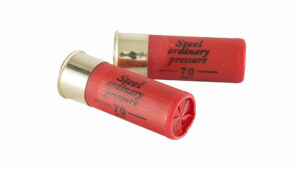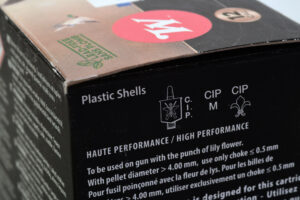FAQ
What type of ammunition are you looking for answers for?
Rifle ammunition
When and on what basis will lead be banned in rifle ammunition?
The authorities in Europe want to ban lead.
The date this ban will come into effect is still under discussion and no final decision has been taken at this stage.
What is a lead-free monolithic bullet?
Monolithic bullets are made from a single piece of 100% copper, which offers near-complete weight retention for greater penetration, including through bone and dense tissue. This technology is used in the Extreme Point Copper Impact WINCHESTER.
What is a lead-free jacketed bullet?
Jacketed projectiles are composed of an alloy jacket and a core made of a different material. This technology avoids excessive copper fouling in the barrel, which is a characteristic of monolithic copper bullets. Winchester has two solutions in its range.
WINCHESTER COPPER FORCE: its jacket, made from a copper-tin alloy, is thin and has a specific profile for instant energy transfer and deep penetration. It has a copper core. This cartridge is recommended for medium to heavy large game.
WINCHESTER VARMINT-X LEAD FREE: Its thin brass jacket has a specific profile for explosive fragmentation. It has a zinc core. This ammunition is designed for control of pests such as foxes and other small game.
Which materials does WINCHESTER use to ensure its lead-free big-game ammunition for rifles is effective?
WINCHESTER has developed a range of lead-free cartridges based on 3 different technologies:
A monolithic copper bullet:
The WINCHESTER Extreme-Point Copper Impact is an all-copper monolithic bullet whose plastic-tipped large cavity is ideal for hunters looking for deep penetration and reliable expansion on medium to large game at any range.
A jacketed bullet with a monolithic copper core:
The WINCHESTER Copper Force™ has been designed to transfer massive energy while providing deep penetration. Its lead-free solid copper core separates from the jacket on impact to penetrate deeply and ensure an exit hole for the vast majority of shots. This traditional jacket around the solid copper core eliminates the barrel fouling problem typical of monolithic bullets, ensuring accuracy and easy cleaning of the rifle. Its high velocity guarantees a flat trajectory and maximum kinetic energy at all ranges.
The COPPER FORCE™ is ideal for all types of game and particularly effective on light to medium game such as roe deer and wild boar.
A jacketed bullet with a zinc fragmentation core:
For varmint control, the WINCHESTER Varmint X Lead Free is a zinc-core jacketed bullet that is ideal for hunters who want very fast energy transfer against varmints.
The COPPER FORCE is lighter than a traditional bullet, is it as effective on big game?
Terminal ballistic performance is determined by kinetic energy, the ability of the bullet to transmit energy to the game (impact diameter) and to maintain energy (mass retention). Kinetic energy is defined by the weight of the bullet and its velocity. The effective transmission of energy to the game can be optimised by a specific bullet design. Mass retention is determined by the materials and design of the bullet.
On impact, a traditional lead bullet will expand up to twice its initial diameter, thereby transmitting its energy. On the other hand, the bullet will lose a significant part of its initial weight (fragmentation of the lead), which reduces its kinetic energy.
COPPER FORCE is a lead-free cartridge that is highly effective on big game, particularly medium-sized game, thanks to:
- Its very high velocity develops kinetic energy comparable to a heavy bullet (4000 joules at the muzzle in 30-06).
- Its impact diameter, the widest ever developed, ensures immediate and very significant t kinetic energy transer to the game.
- Its monolithic copper core guarantees maximum mass retention and therefore conservation of its kinetic energy.
Will other lead-free products be added to the WINCHESTER big-game range?
As a world leader, WINCHESTER will continue to offer lead-free solutions for all types of use.
Is lead-free ammunition as safe to use as lead ammunition?
With all lead and lead-free ammunition, basic safety rules must be heeded in order to reduce the risks to yourself and those around you.
All monolithic ammunition requires special attention to the risk of ricochets.
Are there any restrictions on the use of lead-free ammunition?
Make sure the ammunition is compatible with its intended purpose. This point is addressed in the next question.
When hunting, you should always ensure an ethical shot that is totally lethal to the game at the selected range.
When shooting recreationally, go for ammunition that will guarantee the required performance and safety level.
Are there any technical restrictions on the use of lead-free ammunition?
In principle, there are no restrictions on using lead-free ammunition in modern rifles. In case of doubt, check with your gun dealer.
All Browning/WINCHESTER rifles are compatible with lead-free ammunition.
Do I need to have my scope adjusted before using lead-free ammunition?
It is always advisable to have the scope adjusted when switching to different ammunition.
Do I need to have the gas system adjusted on my semi-automatic rifle before using lead-free ammunition?
No special adjustments are needed when using lead-free ammunition. However, an adjustment may be needed if there is a change in the bullet weight. If in doubt, ask your gun dealer.
Do I need to have an adjustment made to my semi-automatic rifle before using lead-free ammunition with a sound moderator?
It is always advisable to have your rifle’s gas-operated system adjusted when a sound moderator is fitted, regardless of the ammunition used. If your rifle has already been adjusted for use with a sound moderator, no adjustments need to be made if you change ammunition.
Do I have to clean the barrel if I use lead-free ammunition?
In all cases, it is advisable to clean the barrel before using different ammunition in order to remove particles. It is also always advisable to clean the barrel after each use.
Jacketed bullets require standard maintenance.
Lead-free all-copper monolithic bullets can lead to greater copper deposits in the barrel. It is advisable to clean the rifle barrel at regular intervals using a special copper solvent to maintain optimum accuracy.
The COPPER FORCE has a traditional jacket around the solid copper core. This eliminates the problem of barrel fouling typical of monolithic bullets, ensuring accuracy and easy cleaning of the rifle.
Hunting shotshells
When and on what basis will lead be banned in hunting shotshells?
The authorities in Europe want to ban lead.
For wetland areas, the ban has been voted and will apply in February 2023.
For other uses, the effective date of the ban is still under discussion.
What are the differences between an "ordinary pressure" lead-free shotshell and a "high performance" shotshell?
“Ordinary pressure” lead-free shotshells differ from their “high performance” counterparts according to three technical criteria: maximum pressure, maximum velocity and the permitted shot size.
“Ordinary pressure” lead-free shotshells are loaded to a maximum pressure of 740 bar, a maximum velocity of 425 m/s at a distance of 2.5 m from the barrel, and the shot diameter is limited to 3.25 mm (No. 4). These shotshells can be fired from all removable-choke shotguns proofed to 930 bar and are identified on the case and on the packaging.

“High performance“ lead-free shotshells are loaded to a maximum pressure of 1,050 bar and a maximum velocity of 430 m/s at a distance of 2.5 m from the barrel. Their cases and boxes are marked “Max 1,050 bar”.


These “high performance” shotshells can only be used in steel-shot proofed shotguns bearing the Fleur de Lys stamp.


Summary:
|
Ordinary Pressure Lead-free shotshell |
High Performance Lead-free shotshell |
|
Maximum shotshell pressure 740 bar Maximum speed 425m/s at 2,5m Pellets diameter restriction < 3,25mm Removable Chokes allowed All
Guns allowed Removable chokes only Proofed at 930 bar or more
|
Maximum shotshell pressure 1050 bar Maximum speed 430m/s at 2,5m Pellets diameter restriction None Removable Chokes allowed Pellets > 4mm : maximum ½ Removable Chokes recommended maximum ½ for all pellets sizes Guns allowed Removable chokes only Steel Proofed at 1320 Bar Marked Fleur de Lys |
Shotguns with fixed chokes need to be checked by a gunsmith or the local proof house in order to guarantee the original integrity of the barrel and its compatibility with lead-free shotshells.
Which materials does WINCHESTER use in its lead-free ammunition?
- Steel for “ordinary pressure” shotshells intended for shotguns with removable chokes that are proofed to 930 bar or higher.
See our “standard pressure” shotshells
- Steel or copper for “high performance” shotshells intended solely for shotguns that are steel-shot proofed to 1,320 bar (with removable chokes).
See our “high performance” shotshells
- Bismuth for all shotguns, including those proofed to less than 930 bar.
Reminder: the expert opinion of a gunsmith or the local proof house is required for shotguns with fixed-choke barrels in order to guarantee the original integrity of the barrel and its compatibility with lead-free shotshells.
Will other products be added to the WINCHESTER range of lead-free hunting shotshells?
As a world leader, WINCHESTER will continue to offer lead-free solutions for all types of use.
How do I know if I can shoot steel shotshells from my shotgun?
If you have opted for “ordinary pressure” lead-free shotshells, these can be fired from shotguns proofed to 930 bar without choke restrictions*.
If “high performance” lead-free shotshells are used, your shotgun must be steel-shot proofed. If it is, it will have the Fleur de Lys stamped on the barrel. A maximum ½ choke* is recommended. WINCHESTER/Browning shotguns with removable chokes have been steel-shot proofed for over 20 years.

See proof markings on the CIP website
* Reminder: the expert opinion of a gunsmith or the local proof house is required for shotguns with fixed-choke barrels in order to guarantee the original integrity of the barrel and its compatibility with lead-free cartridges.
In case of doubt, your shotgun’s proof type must always be confirmed by your gunsmith or local proof house.
Are there any lead-free WINCHESTER shotshells that can be used in a non steel-shot-proofed shotgun?
Bismuth cartridges can be fired from shotguns that have been proofed to less than 930 bar, to 930 bar, and shotguns that have been steel-shot proofed to 1,320 bar.
Discover our range of bismuth cartridges here.
The expert opinion of a gunsmith or the local proof house is recommended for shotguns with fixed-choke barrels in order to guarantee the original integrity of the barrel and its compatibility with lead-free cartridges.
If your removable-choke shotgun is proofed to 930 bar, you can also fire “ordinary pressure” lead-free shotshells.
WINCHESTER STEEL 28 gramme hunting shotshells and X2 STEEL target shotshells are also included in the “ordinary pressure” category.
Discover the WINCHESTER range here:
| “Ordinary pressure” lead-free shotshells | “High performance” lead-free shotshells | Bismuth | |
| Old shotguns (proofed <930 bar) | NO | NO | YES |
| Fixed-choke | Expert opinion of a gun dealer or proof house required | NO | YES |
| Removable-choke proofed to 930 bar | YES | NO | YES |
| Reminder – Steel-proofed shotgun 1,320 bar (fleur de Lys) | YES | YES | YES |
Which removable chokes should I choose for shooting steel shotshells from my shotgun?
The choice of choke depends on the type of shotshell.
For “ordinary pressure” lead-free 12-gauge shotshells, the IPC confirms that shooters can use their preferred removable choke (from cylindrical to full).
Reminder: the expert opinion of a gunsmith or the local proof house is required for shotguns with fixed-choke barrels in order to guarantee the original integrity of the barrel and its compatibility with lead-free cartridges.
For “high performance” lead-free 12-gauge shotshells with shot that is less than 4 mm in diameter, no more than a ½ choke is recommended for best results. However, ¾ and full chokes can also be used. Important: “high performance” lead-free shotshells cannot be used in fixed-choke shotguns.
In the case of “high performance” lead-free 12-gauge shotshells with shot over 4 mm in diameter, anything above ½ choke is not permitted.
For further information and restrictions on other gauges, visit the CIP or this page informing you of the theoretical restrictions for each calibre.
Do steel shotshells pattern similar to lead shotshells?
No. Steel shotshells contain more shot than lead shotshells at the same grammage. The reason for this is that steel has a lower density than lead. Steel is also harder than lead, and so loses less shape when fired and does not spread as far towards the edge of the pattern. Steel shot will therefore give narrower, more uniform and more regular patterns than lead shot. This is why no more than a ½ choke is recommended for steel shot.
Can I still use the same shot number when I switch from lead to steel?
As steel is lighter than lead, it does not transfer its energy or maintain its velocity as much as a lead shotshell. When switching to steel shotshells, it is advisable to shoot two shot numbers below the lead number (e.g. fire No. 4 steel shot if you fire No. 6 lead shot).
The range must also be reduced by 5 to 10 metres compared to a lead shotshell at the same velocity. In practice, a pigeon shot with No. 6 lead from 35 metres can be shot with No. 4 lead-free from 25-30 metres.
| LEAD No. | STEEL No. |
| 10 | 8 |
| 9 | 7 |
| 8 | 6 |
| 7 | 5 |
| 6 | 4 |
| 5 | 3 |
| 4 | 2 |
| 3 | 1 |
For copper, which is slightly more malleable than steel, we recommend using a shot size one number lower than for lead shot.
Can lead-free shotshells deliver the same performance levels as lead shotshells?
Yes, thanks to decades of experience in the development of lead-free cartridges, WINCHESTER, the world’s leading ammunition manufacturer, offers you a wide range of lead-free cartridges that give similar performance to traditional lead cartridges. Discover the full range of WINCHESTER lead-free cartridges here.
I have heard that lead-free shotshells are ineffective. Is this true?
No. Many tests in the field have shown that modern lead-free shotshells are effective and now deliver the required in-flight and terminal ballistic performance levels.
Can lead-free shotshells damage my "old" shotgun?
“Ordinary pressure” lead-free cartridges can be fired from all removable-choke shotguns that are proofed to 930 bar, whatever material is used to make the shot. Remember that the CIP does not allow the use of “high performance” lead-free shotshells in shotguns that are not steel-shot proofed, i.e. shotguns that are not proofed to 1,320 bar and do not bear the Fleur de Lys proof mark.
If your “old” shotgun does not have either of these proofs, bismuth shotshells are the safest option, e.g. the WINCHESTER Bismuth range. The flexibility of bismuth is a close match to lead and the shot will not damage the barrels on your “old” shotgun. If in doubt, you are strongly advised to speak with your gun dealer.
Reminder: the expert opinion of a gunsmith or the local proof house is required for shotguns with fixed-choke barrels in order to guarantee the original integrity of the barrel and its compatibility with lead-free cartridges.
Can shotshells that use wads made from alternative "degradable" materials damage my shotgun?
Steel shotshells with wads made from non-plastics are coming onto the market. These new wads may react differently from conventional wads. When using a shotshell with a wad that is not made from traditional plastic, make sure the barrel is well protected and not hit by the steel shot, otherwise it may be seriously damaged. If in doubt, you are strongly advised to speak with your gun dealer.
Is there a greater risk of ricochets from steel shot?
With all lead and lead-free ammunition, basic safety rules must be heeded in order to reduce the risks to yourself and those around you.
Steel does not deform, so to limit the risk of ricochets you must take care not to shoot against hard surfaces or water.
Do I have to clean my shotgun barrels if I use lead-free ammunition?
It is always advisable to clean your shotgun barrels after each use, regardless of the ammunition used.
What other points should I bear in mind if I have shot game with steel or copper pellets?
Whichever type of shot is used, it is important to always remove as much of it as possible when cutting up the game. You should also be careful of your teeth when eating game.
Popular resources
CIP Standards
The C.I.P. lays down common rules and regulations for the proof of weapons and their ammunition in order to ensure the mutual recognition of Proof Marks by its member states. Fourteen countries are C.I.P. Member States.
Winchester website
You can find all our products on our WINCHESTER website.
